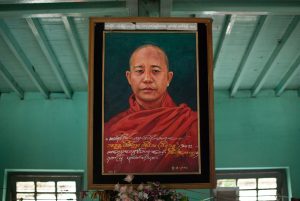The nationalist Buddhist monk Wirathu, notorious for his anti-Muslim bigotry, was released from prison in Myanmar yesterday, after charges that he tried to stir up disaffection against the country’s ousted civilian government were dropped.
Wirathu’s release was confirmed by Maj. Gen. Zaw Min Tun, a spokesman for the Myanmar military, according to the Associated Press, which cited a report in the local People Media news site. “The case was closed and he was released this evening. Even though U Wirathu was released, he is still receiving medical treatment at the Tatmadaw Hospital,” it quoted Zaw Min Tun as saying.
Wirathu is reportedly in fragile health after contracting COVID-19 in prison, and according to The Irrawaddy, has temporarily lost the use of one of his arms.
During Myanmar’s political opening in 2011 and 2012, Wirathu became infamous for peddling an extreme form of ethnic Burman chauvinism and Buddhist ultra-nationalism, while whipping up sentiment against the country’s various Muslim communities. His sermons contributed considerably to the sectarian animosities that justified sectarian tensions in Rakhine State, while foreshadowing the military’s savage assaults against Rakhine’s Muslim Rohingya communities in 2016 and 2017.
Wirathu’s influence waned after the victory of his nemesis Aung San Suu Kyi and her National League for Democracy (NLD) at the 2015 national election. In May 2019, Wirathu was charged under Section 124a of Myanmar’s antique Penal Code, which punishes any action that brings the government into hatred or contempt, for making defamatory comments about Aung San Suu Kyi and her government.
After more than a year on the run, Wirathu turned himself in to the police in November last year, in what many saw as a harbinger of February’s coup, just days before the national election that saw the NLD enlarge its already considerable majority. At the time, the monk explained that the government had “forced me into this situation,” calling on Myanmar citizens to vote against Aung San Suu Kyi and her “evil” NLD government.
The junta authorities have given no reason for the dropping of charges against Wirathu. But as the Democratic Voice of Burma notes, he is just one in a growing list of notorious nationalist figures who have been released from custody in the tumultuous months since the military’s seizure of power.
Among them was Hla Swe, a well-known nationalist publisher and former parliamentarian for the military-backed Union Solidarity and Development Party (USDP). Like Wirathu, Hla Swe turned himself in to police in December 2020 after more than a year at large after being charged under Section 124(a) in August 2019. His crime was that he condemned the country’s leaders while speaking at a rally opposing U.S. sanctions on senior military officials. Nicknamed “Bullet,” Hla Swe was released as part of large-scale prisoner amnesties ordered by the military junta in April.
Another was Michael Kyaw Myint, the leader of the far-right Yeomanry Development Party, who previously served a year in prison after leading an anti-Muslim mob that shut down Ramadan prayers in Yangon’s South Dagon township in 2019. In January, he was arrested for sedition, again for criticizing Aung San Suu Kyi during a campaign speech ahead of the election, before being released by the junta in May.
Before his arrest in January, Michael Kyaw Myint was preparing to erect an obelisk in support of the military, and had echoed the claims of senior military officers that last year’s general election was marred by fraud, which was later used as a justification for the coup. Moe Moe Khaing, a detained central executive committee member of the YDP, was released at the same time.
“I am truly grateful to the SAC government,” Michael Kyaw Myint posted on Facebook after his release in May. “I won’t forget that I owe gratitude. In this new year, new era and under the new government, let’s all engage in unity based on nationalism in politics in which there will never be the NLD.”
The political motivation for the above releases is obvious. But while Wirathu has a track record as a zealous booster of the Tatmadaw and its proxies – he once called on the people “to worship the USDP as if they were worshipping Buddha” and was a staunch defender of the army’s deadly assaults on the Rohingya – the monk’s attitude toward the new junta is unclear.
In a video circulated on social media last month and reportedly recorded on May 8, Wirathu lambasted the military junta for not releasing him earlier.
“The NLD government detained and degraded and persecuted a monk. The SAC is doing the same things, but is also driving a monk crazy. U Hla Swe was granted bail, so I thought it was my turn next week. But I was remanded instead,” he said in the video.
Richard Horsey, a Myanmar adviser to the International Crisis Group, wrote on Twitter that the military had decidedly mixed feelings about Wirathu, who was more of a populist opportunist than a pro-Tatmadaw ideologue.
Like the preceding releases, the dropping of the charges against Wirathu is clearly motivated by the junta’s desire for support from the country’s ultranationalist fringe, but his delayed release suggests that the authorities had at least some second thoughts about whether it was in their interest for him to go free.
“One of the few support bases for the regime is (a part of) the radical nationalist movement, and they wanted him free,” Horsey wrote. “With so many enemies, it pays to keep close to the few friends you have left.”

































